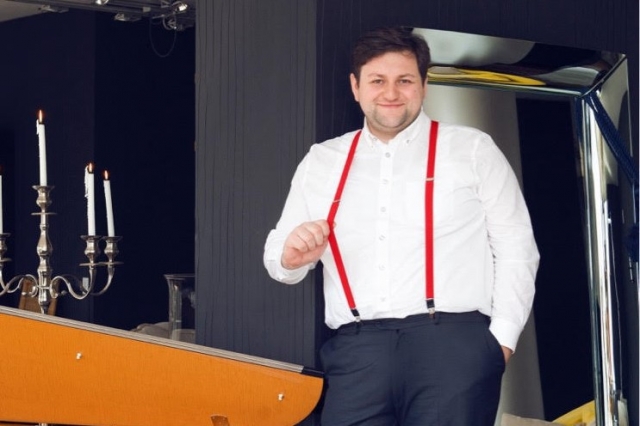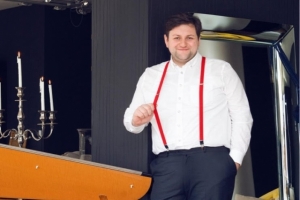30-Year-Old La Scala Baritone to Premiere in Tbilisi
INTERVIEW
Born in Zugdidi, Western Georgia, Mikheil Kiria is 30-year-old Baritone who has already conquered many of the world's stages. Georgia is proud of its outstanding voices scattered around the world. Having graduated from Tbilisi State Conservatoire and later La Scala, Mikheil is a follower of the Andghuladze musical family school. On June 14, he will sing in Donizzetti’s “L’Elisir D’Amore” at Tbilisi Opera and Ballet Theater, staged on the basis of paintings by legendary figurative artist Fernando Botero.
Kiria’s debut in the same musical masterpiece took place very recently, at Deutsche Oper Berlin, where he sang with legendary Roberto Alagna and Aleksandra Kurzak the same part of Dulcamara, for which he recived positive media critique:“Mikheil Kiria deserves a special mention. He performed his part magnificently. His comic talent effectively merges with his ample, deep, rich bass. This unique unity was a real festival for the audience,“ wrote Renate Dahms. “There was another sparkling star – Mikheil Kiria – too as a merchant doctor Dulcamara. He presented himself to the listeners not only as a great bass but also by offering an ideal performance due to his perfect means of expressions,” Magdalena Grzybowska wrote. "Mikheil Kiria was a terrific Dulcamara, mixing clean articulation with a bright, lively baritone," Hugo Shirley wrote on his blog.
Besides Berlin Deutsche Oper, he is an invited soloist at the Amsterdam National Opera, Frankfurt Opera, Glyndebourne Festival Opera, Verona Philharmonic Theater, Festival Verdi di Parma, Paris Chatelet Theater, and others. In 2014, at the International Vocal Competition in Brescia, Michele Nocciola conferred him the Maria Callas special prize for best interpretation. GEORGIA TODAY is proud to have him in Tbilisi and took the chance to meet him.
How are you feeling prior to your performance in Tbilisi?
I've performed a couple of times with the conductor Nika Rachveli, but I'll be singing the whole performance for the first time, in this splendid performance by Botero in Tbilisi. In Milan Gallery, there is a very famous salon on the left, where paintings of different painters are displayed. There is one of Fernando Botero’s paintings that I cannot forget: a plump ballerina, and I thought that I had found my spouse (joking). By saying this, I imply how memorable Botero’s paintings are. The performance itself as interesting as it is dynamic.
The opera buffa (comic opera) usually requires a lot of motion, which is very difficult. Besides the physical movement, Donizzetti’s personages are very lively. I would like to extend my gratitude to the administration of Tbilisi State Opera Theater, to everyone who enabled us to participate in such a marvelous performance in Tbilisi. Special thanks to Badri Maisuradze, the artistic director. We, Georgians are not indulged with such operas, as usually the Georgian audience attends only performances of Opera Seria (serious opera). Therefore, it is a very interesting and I would like to wish the opera authorities a lot of success in this direction.
As for my disposition, I can tell you that I hear a lot of my colleagues saying that they are very nervous before performing in Tbilisi. Just the contrary, I feel very positive. I'm sure that my audience will like us because we all do our best. I'm fond of performances rather than concerts, as I like everything that it consists of – make-up, direction, costume, light, stage – all these components give a singer a lot. Plus, it was my dream to perform here as it is my native stage.
You mentioned Botero. How important is the aesthetic side of the performance for you?
It really matters. Opera today differs from the opera that existed some 40-50 years ago. In those days, the only thing that mattered was vocal capacity. Nowadays, opera comprises multiple realms of art. Today, directors are much more important. Opera is much more visual than it used to be. It is no longer centered on a singer. Modern performances cheer up the audience. High spirits make opera theaters sell more tickets!
What can you say about the character of Dulcamara?
I first sang it on May 23, at Deutsche Oper Berlin. I sang with Roberto Alagna and Aleksandra Kurzak, a performance that I'll never forget. This was a special day for me – to sing with legend Alagna and his spouse Aleksandra, who is a great singer and a fantastic partner on stage.
Tell us about the Georgians you'll be singing with on June 14
Besides the artists leading international careers, there are novices, too. Some of them are even students. The opera theater gives them a lot of opportunities. When I was starting, we were experiencing hard times, as the opera was closed and we were scattered throughout different halls of Tbilisi. I went to La Scala Academy, having no experience at Tbilisi Opera Theater. That is where my debut took place, in the opera by Richard Strauss “The Woman without Shadow”. Therefore, the performance of June 14 is really important for me. Since my debut, I have sung 29 performances on the La Scala stage. Now, my calendar is full until 2020.
What are your plans for the future?
On October 15, I'll sing the most important part for me –Verdi’s Falstaf, written on the basis of Shakespeare’s comedy - at the Verdi Festival. It is a paramount part for a Baritone. Falstaf requires physical strength as well as corresponding voice and technique. Therefore, I'm happy to be given an opportunity to present myself in Parma in front of a critical but correct audience.
By Maka Lomadze
Photo by Guram Muradov











